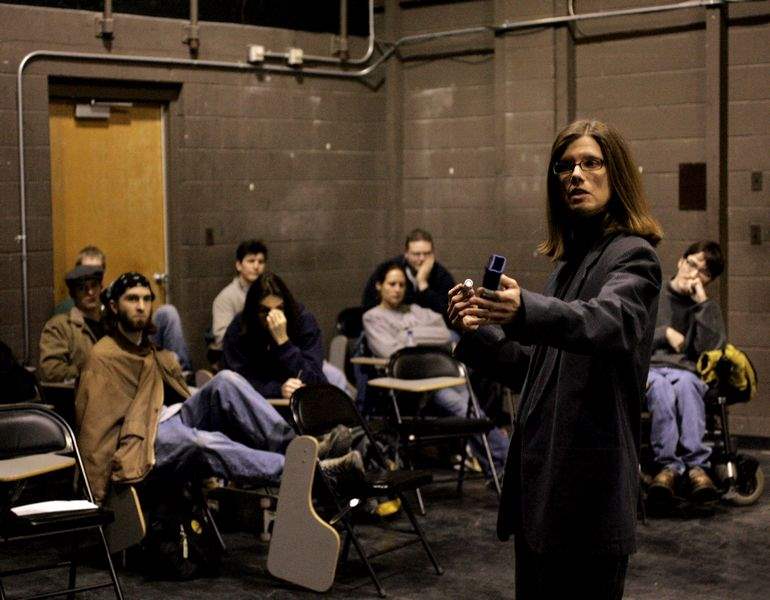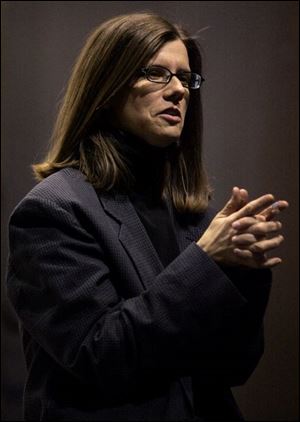
Focus is on film censorship at UT symposium
3/31/2005
Tammy Kinsey teaches a film class at the University of Toledo.
Wadsworth / Blade

Tammy Kinsey.
Tammy Kinsey makes grown men quiver and 21-year-old frat boys cringe and seen-it-all-before sophomores blush. She has the mouth of a fisherman who just stabbed his finger on a hook without all the anger.
Which is jarring. Her voice is a flat NPR-ish monotone, and her dress is that of an intellectual on a Sunday morning bagel run: jeans, large work shirt, and thin black rectangular eyeglass frames that dominate her face.
Ms. Kinsey, 39, teaches film at the University of Toledo, and she is only shocking when it s necessary: Which, for her, is Mondays.
Requiem for a Dream, she asks her class. Anyone seen it?
Senior Nate Dovel nods.
Do you want to describe the scene that landed it an NC-17?
I d rather not.
Oh, come on.
I wouldn t even know how to describe it ... anatomically.
Her class, Film 4370, by necessity, gets shocking. The subject is film censorship and its reasons, history, and targets. Once we know the language and the background of censorship, she said, once we know how to talk about it, we start to understand why some people like or dislike about everything you put out.
Ms. Kinsey takes a long view of censorship, starting with the famous early silent short of two men dancing (often called the first gay-themed movie), and continuing through the Red Scare of the 1950s, the impact of Mae West, and the mysterious decisions of the MPAA ratings board.
Sounds compelling, right?
Not your typical film school class on Russian editing theory?
Yet you don t have the time or money to enroll? Tomorrow and Saturday, Ms. Kinsey and her class are hosting the university s 5th Annual Censorship Symposium, and the topics go beyond film: Saturday begins with a lecture on music and censorship, while tomorrow, the subject expands to include academic censorship.
Saturday also brings a 2:30 p.m. screening of Andy Warhol s rarely-seen Couch (which partly stars Allen Ginsberg and Jack Kerouac), while Friday at 7 p.m. there s The Control Room, a terrific fly-on-the-wall documentary about the Middle Eastern news channel Al Jazeera. All symposium events are free and open to the public (although a $2 donation will be suggested).

Tammy Kinsey teaches a film class at the University of Toledo.
If you go, watch for Fletcher C. Rumbaugh. He s a mountain of a freshman with the broad shoulders of a linebacker. He ll be presenting a paper on the insides-and-out of various movie ratings boards. He s going to be a sacrificial lamb, Ms. Kinsey says.
Sounding a bit more nervous now, Mr. Rumbaugh says: Tammy, how many come to this thing?
Sometimes, lots, she says. And sometimes, not a ton.
Film 4370 was born of strife.
It meets Monday nights for three hours. Ms. Kinsey only teaches it every other year (this semester, about 20 students, mostly film majors, are enrolled), and she s discovered, she said, that the only way to discuss honestly what can t be shown and what can t be said is to say it and to show it and then discuss it.
I shock them in ways they wouldn t even imagine, I think.
This wasn t always possible.
Five years ago Ms. Kinsey and Elspeth kydd, the department s associate chair, were putting together the annual showcase of new student films. One student complained about some sexually explicit content, Ms. kydd said. But when Ms. Kinsey and Ms. kydd sat the students down to talk about the ramifications of not showing a student s film because it offended a handful of viewers, the teachers realized these kids had never had a forum to talk about this kind of thing, Ms. Kinsey said.
They didn t know the history, and they hadn t thought through what it meant to censor a film.
Ideologically, a few students say, it probably sounds like a liberal workshop and there are times when the line between artistic choice and self-censorship gets fine but it turns out to be far more middle-of-the-road than they expected. Keith Munden, a junior who works part-time at a movie theater in Sandusky, said Ms. Kinsey s course is his favorite class at UT. It s not just about censorship being bad but about why some people would want to censor a movie.
Jonathan Bartholomy, a senior, listens and adds: It s really like a 360-view. We talk about people s rights, and the right to not see something. It holds my attention for three hours every week and that says something.
In the past decade, UT s film department has blossomed exponentially. When she started at the university in the early 1990s, Ms. kydd says there were about 30 film majors. Now there are about 125. I think it s grown so much, said department chairman Sue Ott Rowlands, because film is so primary to a lot of high school students and when they graduate, it s all that interests them.
Ms. Kinsey s class has a touch of cinephilia. When some of these students repeat a line from a Die Hard movie, it s not just the words they know by heart, but the phrasing and the inflection. She brings up a topic, such as the history and intentions of the ratings board, and it gets weaved through a discussion that starts with First Amendment issues and continues through the economics behind director s cuts, the effectiveness of PG-13, and whether there s an undiscovered Ewan McGregor nude scene in The Phantom Menace.
It has the drift of good conversation. For a bit they discuss the use of a murder scene in Cruising, the 1980 picture about a serial killer stalking gay nightclubs in Manhattan. That guy raises the knife, Ms. Kinsey says, and all I could think about was how ...
She stops herself, and sighs with mock exaggeration. Be honest, guys. Can any of you watch a movie now without noticing all of the issues involved?
Jada Jones, a senior, sits up.
No, we can t, she says. My friends are always like, Can t you just watch a movie without, you know, critiquing all the time?
I know. Sadly, we can t.
The University of Toledo s fifth annual Censorship Symposium runs tomorrow through Saturday in the Center for Performing Arts s Lab Theater, room 1039. All events are free but there is a suggested donation of $2. Information: 419-530-2202, or for a full schedule of screenings and lectures: www.film.utoledo.edu.
Contact Christopher Borrelli at: cborrelli@theblade.comor 419-724-6117.